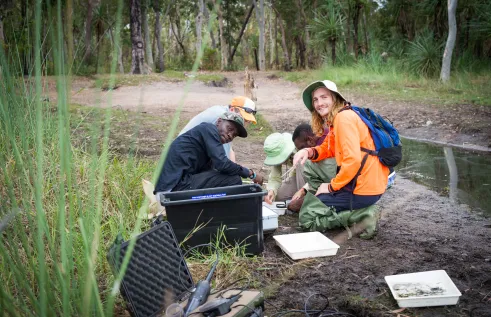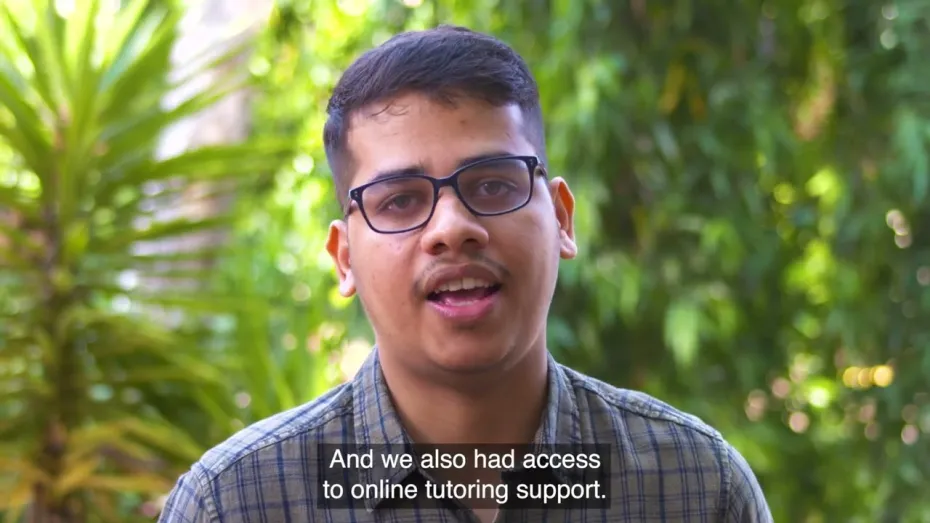Key details
Duration
Locations
Entry requirements
View full entry requirementsCredit points required
160Course code
Overview
The Master of Applied Spatial Science has been designed to provide upskilling in geographic information systems (GIS) and remote sensing skills to a diverse array of vocations. The course is aimed at those with little or no previous spatial science experience and can be undertaken by students with a bachelor's degree in any field. The course will guide you through the fundamentals and develop more advanced geospatial skills. The outcome will be that you will be able to solve real-world problems across a diverse range of fields and vocations, such as environmental science, health, agriculture, mining, disaster and emergency management, and even tourism and business.
Spatial Science skills are in high demand in Australia and overseas, and spatial science graduates can work across a broad range of roles, including Spatial Analysts, Spatial Ecologists, GIS Analysts, Remote Sensing Specialists, Geospatial Intelligence Analysts, Geospatial Data Analysts, Geomarketing Officers, Cartographers, Surveyor assistants, Surveyor Technicians, or Drone Pilots/Photogrammetrists. Students in this course actively participate in professional work placements and field work.
Through this course, you will gain important transferable employability skills, including collaboration, preparing a resume and addressing selection criteria, clear scientific writing, report writing, and preparing and delivering oral presentations.
The Graduate Certificate of Spatial Science is nested within the Master's degree course as an entry and exit pathway.
Career opportunities
Master of Applied Spatial Science graduates are in high demand in Australia and internationally to work in governments, industry, and research, taking on a wide range of roles, including:
- Remote Sensing Specialist
- GIS Analyst/Technician
- Earth Observation Analyst/Scientist
- Geospatial Intelligence Analyst
- GIS Manager
- Geospatial Data Scientist
- Environmental Consultant
"Australia is grappling with a significant shortage of geospatial professionals" (Geospatial Council of Australia, 2025) as the demand for geospatial experts across Australian states and territories is growing exponentially. The average salary for a graduate geospatial analyst in Australia is $86,500 per annum (Glassdoor Australia, 2025). Graduates do not require certification from a professional body to practice their profession.
This course offers a pathway for professionals from any background to upskill or reskill for career opportunities in geospatial science and remote sensing, including roles with industry, government research institutes, or private consultancies. There are opportunities for graduates to apply for and enter the NTG Graduate Development Program upon completing the course.
Practical experience
This program will make you work through high-quality hands-on practical exercises including case studies, field-based and workplace learning relevant to industry standards.
Credit transfers and advanced standing
Pathways
Pathways for Higher Education to Higher Education
For information about credit transfer available to students with complete or incomplete study at this or other Institutions refer to Pathways for Higher Education to Higher Education
Credit transfer
For further information on credit transfer and how to apply visit ASK CDU
Credit transfers and advanced standing
Credit transfer
For further information on credit transfer and how to apply visit ASK CDU
Fees
Non-Commonwealth supported places
Full fee paying places are available in this course.
Information about fees and charges can be found at Fees and Payments.
International tuition fees
The annual tuition fee for full time study in 2026 is AUD $37,224.00. This equates to $4,653.00 per 10 credit point unit (0.125 EFTSL).
These fees are subject to increases annually, effective at the start of each calendar year.
You can find a list of International fees and payments you can expect to pay as part of your studies in Australia. See 2026 Higher Education International Annual Tuition Fees.
CDU offers a number of scholarships to international students to assist with the cost of study.

Why study science or the environment at CDU?
Interested in solving our planet's biggest environmental issues? There's never been a better time to study a postgraduate degree in science, environmental science and management with CDU. Gain advanced skills and knowledge that help progress your career. Apply critical thinking to future-focused solutions across real-world problems.
- #2 Australian university for postgraduate employment outcomes (GUG 2024)
- Choose to study online, on campus, part-time or full-time as it suits you

Why study science or the environment at CDU?
If you're interested in finding solutions to our planet's environmental issues, there's never been a better time to study science, environmental science and management at CDU. You'll be prepared to apply the academic theories and principles you learn in class to real-world problems in a diverse range of careers.
- #2 Australian university for postgraduate employment outcomes (GUG 2024)

Why study science or the environment at CDU?
Interested in solving our planet's biggest environmental issues? There's never been a better time to study a postgraduate degree in science, environmental science and management with CDU. Gain advanced skills and knowledge that help progress your career. Apply critical thinking to future-focused solutions across real-world problems.
- #2 Australian university for postgraduate employment outcomes (GUG 2024)
- Choose to study online, on campus, part-time or full-time as it suits you

Why study science or the environment at CDU?
If you're interested in finding solutions to our planet's environmental issues, there's never been a better time to study science, environmental science and management at CDU. You'll be prepared to apply the academic theories and principles you learn in class to real-world problems in a diverse range of careers.
- #2 Australian university for postgraduate employment outcomes (GUG 2024)
What will I study?
This program (160 credit points) contains 70cp of core studies in geospatial science (a statistical unit, five spatial science units, and a research skills unit), 40cp of the research project, and 50cp of specialist electives. The special electives include 20cp of research methodology electives and 40cp of electives selected from disciplines such as Environmental Science, Health, Disaster & Emergency Management, Information Technology, Engineering, Project Management, or Indigenous Knowledge.
Course structure
There is a range of flexible delivery options which include online units, face-to-face tutorials, and for those balancing life, work and family responsibilities, there is the option to study this degree 100% online. There are also opportunities to access scholarships to support your study.
A candidate must successfully complete units totalling 160 credit points (cp) as detailed below. All units are valued at 10 credit points unless otherwise indicated.
Students must complete 60cp Core Units, 60cp Specialist Elective units, and 40cp Research Units.
Students must consult with the Course Coordinator for the selection of specialist elective units.
| Unit type | Credit Points | Specific requirements |
| Core (6 units) | 60cp | Compulsory Core units totalling 60 credit points as detailed below. HIT137 Software Now (replaces SID403 Research Skills from 2026) |
| Specialist Electives (6 units) | 60cp | Specialist Elective units totalling 60 credit points from one or more of the specialisations below: Research Methodology Environmental Science Humanitarian Aid, Emergency and Disaster Management Health Information Technology Civil and Structural Engineering Business and Project Management Indigenous Knowledges |
Research Units (2 units) | 40cp | Research totalling 40 credit points as detailed below: ENV821 Research Proposal (20cp) ENV822Research Thesis (20cp) (ENV821 (20cp) and ENV822 (20cp) replace ENV820 Research Project x 2 (20cp repeatable unit) from 2025) |
| 160cp |
Course Rules (unless otherwise indicated in the above course structure)
- See the Higher Education Course Rules (Award Requirements) in the Units and Courses Policy.
COURSE CHANGES AND TRANSITIONAL ARRANGEMENTS - 2026
- Core unit SID403 Research Skills is replaced by HIT137 Software Now. Students who have completed SID403 prior to 2026 do not have to complete HIT137.
- SID515 Professional Practice in Environmental Management 2 (new from 2026) has been added as a Specialist Elective unit.
- Specialist Electives: students are no longer required to complete 20 credit points of Research Methodology units plus 30 credit points from one or more of the available specialisations. Students are required to complete 60 credit points of Specialist Electives.
COURSE CHANGES AND TRANSITIONAL ARRANGEMENTS - 2025
- ENV527 Earth Observation Data Programming has been added as a specialist elective unit within the Environmental Science grouping.
- Research unit ENV820 Research Project (20cp repeatable) is replaced by ENV821 Research Proposal (20cp) and ENV822 Research Thesis (20cp). Students who have completed ENV820 once should enrol in ENV822 Research These (20cp).
COURSE CHANGES AND TRANSITIONAL ARRANGEMENTS - 2024
- SBI209 Design and Analysis of Biological Studies has been removed as a core unit. Students who have completed SBI209 do not need to complete ENV511.
- DEM516 Reflective Case Study: Humanitarian, Emergency and Disaster Management is no longer available from the Humanitarian Aid, Emergency and Disaster Management specialisation. Students who have completed this unit prior to 2024 will have it counted towards their Specialist Electives.
Study plan
STUDENTS COMMENCING IN SEMESTER 1
The Recommended Study Plans provided below are suitable for students enrolling in a full-time or part-time study load. Students entering this course with advanced standing, or wishing to vary their study plan due to work, personal, financial or other reasons should use the table as a guide to create an individual study plan.
When designing an individual study plan:
- maintain the basic order in which units are to be attempted; and
- check the assumed knowledge, pre-requisite and co-requisite requirements for each unit.
Please note:
- Students are advised to complete ENV511 Real-World Statistics and Data Reasoning before enrolling into ENV518 Applied Spatial Analysis for Real-World Problems.
- ENV506 Environmental Monitoring and Modelling and ENV518 Applied Spatial Analysis for Real-World Problems are offered in Intensive 6.
- Consult the Course Coordinator in selecting specialist elective units.
| Legend: | CO = Core Unit | R = Research | SE = Specialist Elective |
Full-Time Study Plan
| Semester 1 | Semester 2 | Intensive 6 | |||
| Year 1 | |||||
| ENV502 Remote Sensing | CO | Specialist Elective | SE | ENV506 Environmental Monitoring and Modelling | CO |
| ENV508 Geographic Information Systems and Spatial Thinking | CO | Specialist Elective | SE | ENV518 Applied Spatial Analysis for Real-World Problems | CO |
| ENV511 Real-World Statistics and Data Reasoning | CO | ||||
| HIT137 Software Now (replaces SID403 from 2026) | CO | ||||
| Year 2 | |||||
| Specialist Elective | SE | ENV822Research Thesis (20cp) (replaces ENV820 from 2025) | R | ||
| Specialist Elective | SE | Specialist Elective | SE | ||
| ENV821 Research Proposal (20cp) (replaces ENV820 from 2025) | R | Specialist Elective | SE | ||
| Legend: | CO = Core Unit | R = Research | SE = Specialist Elective |
Part-Time Study Plan
| Semester 1 | Semester 2 | Intensive 6 | |||
| Year 1 | |||||
| ENV502 Remote Sensing | CO | Specialist Elective | SE | ENV506 Environmental Monitoring and Modelling | CO |
| ENV508 Geographic Information Systems and Spatial Thinking | CO | ||||
| Year 2 | |||||
| ENV511 Real-World Statistics and Data Reasoning | CO | Specialist Elective | SE | ENV518 Applied Spatial Analysis for Real-World Problems | CO |
| HIT137 Software Now (replaces SID403 from 2026) | CO | ||||
| Year 3 | |||||
| Specialist Elective | SE | Specialist Elective | SE | ||
| Specialist Elective | SE | Specialist Elective | SE | ||
| Year 4 | |||||
| ENV821 Research Proposal (20cp) (replaces ENV820 from 2025) | R | ENV822Research Thesis (20cp) (replaces ENV820 from 2025) | R | ||
_____________________________________
STUDENTS COMMENCING IN SEMESTER 2
The Recommended Study Plans provided below are suitable for students enrolling in a full-time or part-time study load. Students entering this course with advanced standing, or wishing to vary their study plan due to work, personal, financial or other reasons should use the table as a guide to create an individual study plan.
When designing an individual study plan:
- maintain the basic order in which units are to be attempted; and
- check the assumed knowledge, pre-requisite and co-requisite requirements for each unit.
Please note:
- Students are advised to complete ENV511 Real-World Statistics and Data Reasoning before enrolling into ENV518 Applied Spatial Analysis for Real-World Problems.
- ENV506 Environmental Monitoring and Modelling and ENV518 Applied Spatial Analysis for Real-World Problems are offered in Intensive 6.
- Consult the Course Coordinator in selecting specialist elective units.
| Legend: | CO = Core Unit | R = Research | SE = Specialist Elective |
Full-Time Study Plan
| Semester 1 | Semester 2 | Intensive 6 | |||
| Calendar Year 1 | |||||
| HIT137 Software Now (replaces SID403 from 2026) | CO | ||||
| Specialist Elective | SE | ||||
| Specialist Elective | SE | ||||
| Specialist Elective | SE | ||||
| Calendar Year 2 | |||||
| ENV502 Remote Sensing | CO | ENV821 Research Proposal (20cp) (replaces ENV820 from 2025) | R | ENV506 Environmental Monitoring and Modelling | CO |
| ENV508 Geographic Information Systems and Spatial Thinking | CO | ENV518 Applied Spatial Analysis for Real-World Problems | CO | ||
| ENV511 Real-World Statistics and Data Reasoning | CO | ||||
| Specialist Elective | SE | ||||
Calendar Year 3 | |||||
| ENV822Research Thesis (20cp) (replaces ENV820 from 2025) | R | ||||
| Specialist Elective | SE | ||||
| Specialist Elective | SE | ||||
| Legend: | CO = Core Unit | R = Research | SE = Specialist Elective |
Part-Time Study Plan
| Semester 1 | Semester 2 | Intensive 6 | |||
| Calendar Year 1 | |||||
| HIT137 Software Now (replaces SID403 from 2026) | CO | ||||
| Specialist Elective | SE | ||||
| Calendar Year 2 | |||||
| ENV502 Remote Sensing | CO | Specialist Elective | SE | ||
| ENV508 Geographic Information Systems and Spatial Thinking | CO | Specialist Elective | SE | ||
| Calendar Year 3 | |||||
| ENV511 Real-World Statistics and Data Reasoning | CO | ENV518 Applied Spatial Analysis for Real-World Problems | CO | ||
| Specialist Elective | SE | ENV506 Environmental Monitoring and Modelling | CO | ||
| Calendar Year 4 | |||||
| Specialist Elective | SE | ENV821 Research Proposal (20cp) (replaces ENV820 from 2025) | R | ||
| Specialist Elective | SE | ||||
| Calendar Year 5 | |||||
| ENV822Research Thesis (20cp) (replaces ENV820 from 2025) | R | ||||
Entry requirements
Admission criteria
Successful completion of a recognised bachelor's degree or equivalent international qualification.
International entry pathway
Applicants who have completed the CDU International Masters Qualifying Program (ZMQP01) or the Accelerated International Masters Qualifying Program (ZAMQP2, ZAMQP1) are eligible for entry.
Essential requirements
English language requirements
DOMESTIC STUDENTS
To gain entry into Charles Darwin University, all Higher Education applicants must satisfy the University's English Language Proficiency Requirements for their chosen course of study. All applicants will be required to supply evidence of this at the time of application.
The minimum English language requirement for this course can be met by evidencing of one of the following:
| Year 12 | Successful completion of Year 12 within Australia, or an equivalent qualification from an approved country where English is the official language (refer to our approved standard and extended lists included below). |
| 0.5 FTE Higher Education Study | Successful completion of at least 0.5FTE of higher education study from Australia or an approved country where English is the official language (refer to our approved standard and extended lists included below). If studies were completed from a country on the extended list, they must have been completed within the past five (5) years. |
| CDU Enabling Course | Successful completion of a Charles Darwin University enabling program of at least 0.5FTE (40 credit points). |
| TAFE Qualification | Successful completion of a recognised TAFE qualification at a Certificate III level or higher from Australia. |
| AHPRA Registration | Current AHPRA registration as a Division 1 or Division 2 nurse. Registration must be current at the time of course commencement. |
| English Test^ | Completion of an approved English test within two years of commencement, meeting the minimum scores outlined in the table below. |
^ Minimum Requirements for English Tests:
| Postgraduate requirements | Undergraduate requirements | |
| CDU ELICOS - English for Academic Purposes | Successful completion of EAP004 | Successful completion of EAP003 |
| International English Language Testing System (IELTS) Academic test | Overall minimum: 6.5 No band below: 6.0 | Overall minimum: 6.0 No band below 6.0 |
| Cambridge English: Advanced (CAE) | Overall minimum: 176 No skill below: 169 | Overall minimum: 169 No skill below 169 |
| Pearson Tests of English (PTE) Academic | Overall minimum: 58 No score below 50 | Overall minimum: 50 No score below: 50 |
| Test of English as a Foreign language | Overall minimum: 79 Minimum writing score: 21 | Overall minimum: 60 Minimum writing score: 21 |
IELTS One Skill Retake is accepted, allowing candidates to retake a single skill within 60 days of sitting their initial test. One Skill Retake results are valid for two years from the date of the first test (not from the date of the Retake test) to the date of commencement at CDU.
CDU accepts combined results from two test sittings of IELTS Academic, PTE Academic, or TOEFL, taken within a six-month period, if:
- Both tests were under the same testing system; and
- The overall score in both tests meets the overall minimum; and
- The applicant achieved the section minimum for each section in at least one test.
Recognised English-speaking countries:
| Standard List | Antigua and Barbuda, Australia, Barbados, British Virgin Islands, Canada, Ireland, New Zealand, Singapore, South Africa, United Kingdom, United States of America. |
| Extended List | Bermuda, Botswana, Cayman Islands, Ethiopia, Fiji, Kenya, Malawi, Malta, Mauritius, Seychelles, St Vincent and the Grenadines, Tanzania, Trinidad and Tobago, Vanuatu, Zimbabwe. |
For further details on the English requirements for CDU courses, please refer to the CDU English Language Proficiency Policy.
INTERNATIONAL STUDENTS
To gain entry into Charles Darwin University, all Higher Education applicants must satisfy the University's English Language Proficiency Requirements for their chosen course of study.
The minimum English language requirement for this course is met by either undertaking previous education from an English-speaking country or undertaking one of the following English language tests and obtaining the minimum requirements listed below.
| CDU English for Academic Purposes 4 (ZEAP40) | Successful completion of EAP004 English for Academic Purposes 4 |
| IELTS Academic Module (including One Skill Retake) | A minimum overall score of 6.5 with no band less than 6.0. |
| Cambridge Advanced English (CAE) | A minimum overall score of 176, with no skill below 169. |
| Common European Framework Certificate of English Proficiency | A minimum overall grade of C1, valid for three years from the date of the test to the date of commencement at CDU. |
| Pearson Test of English (PTE) Academic module | A minimum overall score of 58 with no score lower than 50. |
| TOEFL Internet-based Test (iBT) | A minimum overall score of 79 with a minimum writing score of 21. |
* All tests are valid for two years from the date of the test to the date of commencement at CDU, unless otherwise specified.
* Where applicable, international applicants must also satisfy the Department of Home Affairs (DHA) English language requirements for student visa applications.
Do you have a question regarding English requirements at CDU? Please email: international@cdu.edu.au.
The people-first approach to flexibility and supportive learning environment at CDU meant I could find a balance with study, work and family life.
Nikki
CDU student

I am very proud that I am now an environmental expert who can work anywhere on this planet. There is nothing that can be done on the development of any projects without environmental experts. So, it is a very promising career.
Cassian
CDU student

The people-first approach to flexibility and supportive learning environment at CDU meant I could find a balance with study, work and family life.
Nikki
CDU student

I am very proud that I am now an environmental expert who can work anywhere on this planet. There is nothing that can be done on the development of any projects without environmental experts. So, it is a very promising career.
Cassian
CDU student

Course details
Accreditation
This course is accredited by the University in accordance with the Higher Education Standards.
Inherent Requirements
There are inherent requirements for this course. Students must read and understand the requirements for this course.
Australian qualification framework
This course is recognised in the Australian Qualifications Framework at Level 9.
Additional information
Contact details
For further information about the course, enrolment procedures, closing dates and other administrative issues please contact Student Central on:
You make CDU
Together we are a positive force for change in our communities and the world.
Learn more about environmental management
Vamshidhar is from India and studied a Master of Environmental Management at CDU. Hear more about his experience of studying, living, working and playing in Darwin, Northern Territory, Australia.
You make CDU
Together we are a positive force for change in our communities and the world.
Learn more about environmental management
Vamshidhar is from India and studied a Master of Environmental Management at CDU. Hear more about his experience of studying, living, working and playing in Darwin, Northern Territory, Australia.
How to apply
There are many ways to apply to CDU. The method you use depends on your course type, where you live and whether you are a new or returning student to CDU.
Remember to apply early for your best chance at securing an offer to study with us.
SATAC
SATAC is the application channel for residents of NT, ACT, SA, WA, QLD, VIC, NSW or TAS.
International applications
Applications must be submitted online through our application portal, Studylink. You'll need a valid email address to create your online account. Once you have started your application, you will be able to save it and resume it later. There is no application fee when you apply online.
You may be able to lodge a direct application; however, there may be restrictions on your geographic location. If you cannot submit a direct application via the application portal, please apply through one of our registered agents.



Share this course